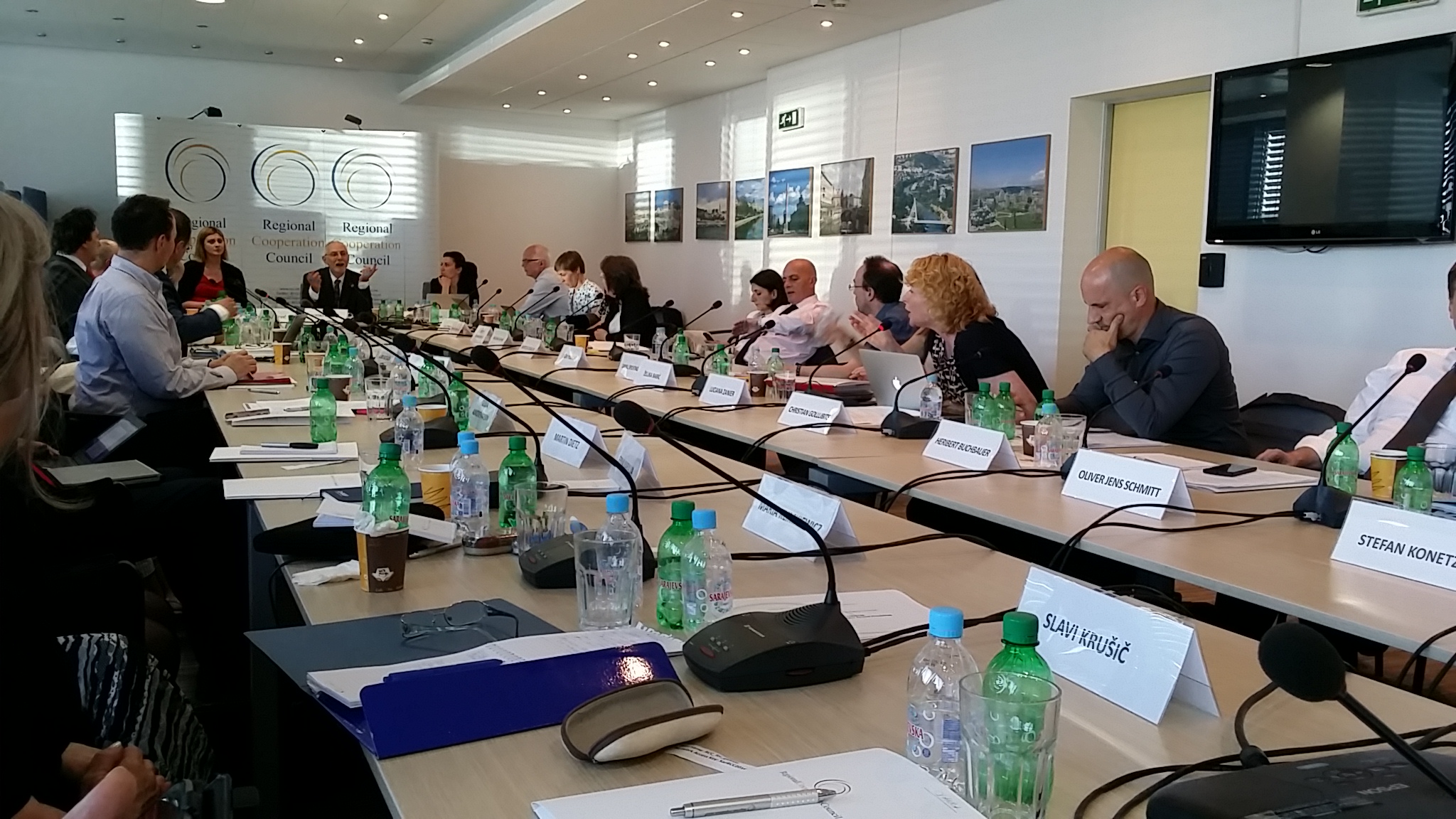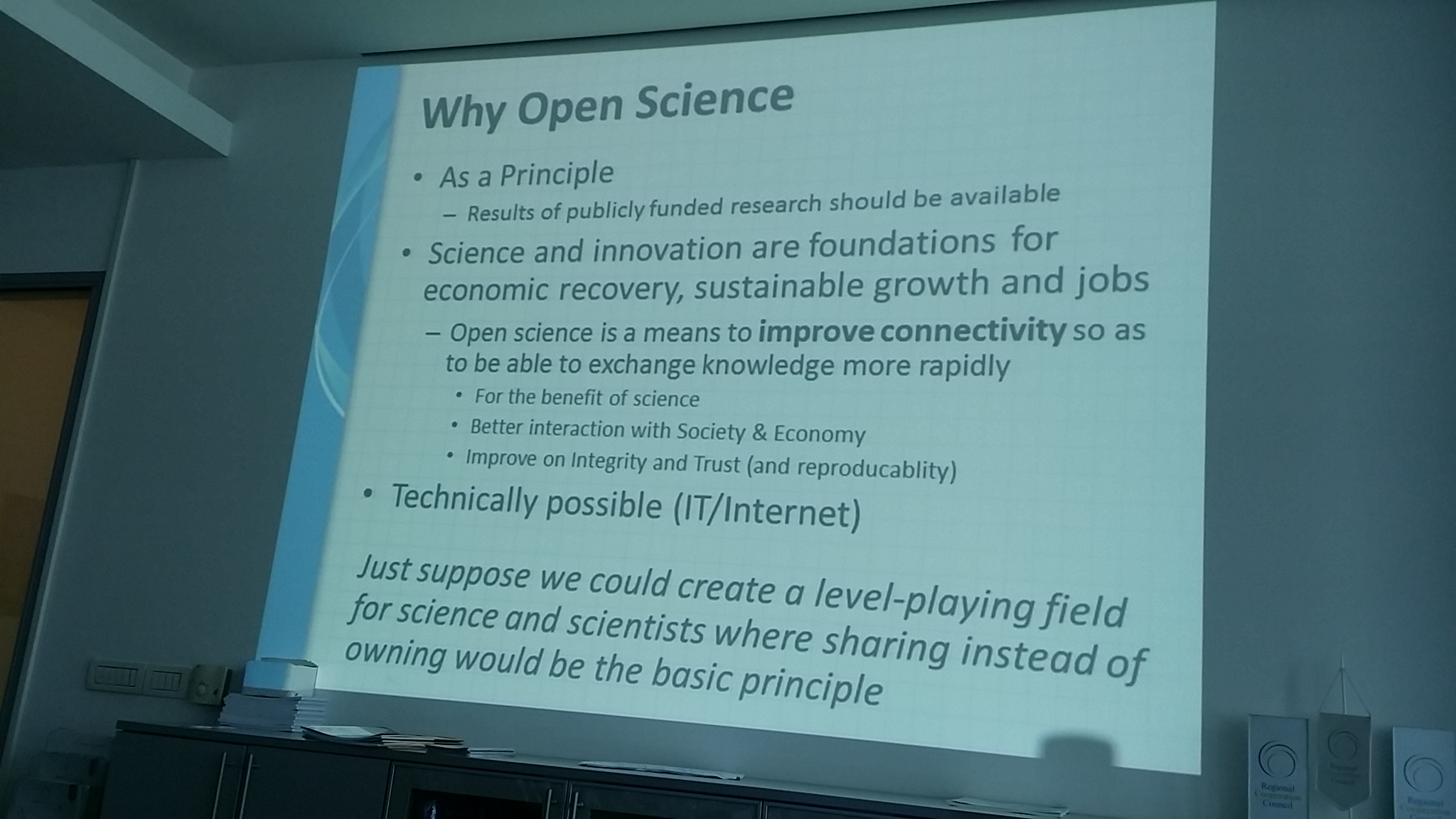[Theme in Focus] Steering Platform on Research for WB | Open Access and Open Data. WBC-RTI.info Newsletter Aug./Sep., 2016
18th meeting of the Steering Platform on Research for the Western Balkans successfully held in Sarajevo - Event Review and Conclusions
18th meeting of the Steering Platform on Research for the Western Balkans co-chaired by the Regional Cooperation Council (RCC) and European Commission (DG Research and Innovation, Directorate on International Cooperation) took place on June 7, 2016 in Sarajevo at RCC premises.  This Steering Platform had been very useful and timely to take stock of the actions and to steer the work further on concrete actions in convergence and synergy with all the regional stakeholders. Final conclusions together with the presentations are available in the text below.
This Steering Platform had been very useful and timely to take stock of the actions and to steer the work further on concrete actions in convergence and synergy with all the regional stakeholders. Final conclusions together with the presentations are available in the text below.
In the opening session, the representative from Bosnia and Herzegovina welcomed all participants in Sarajevo underlining the important role of the Steering Platform on Research both for the region and the economies.
The Commission welcomed the opportunity to meet with all the Western Balkans and relevant stakeholders together which was a valuable and timely occasion to take stock of actions taken and more importantly to steer further the work aiming at strengthening the research and innovation capacity and improving the scientific excellence in the Balkan Region.
Topics that have been presented and discussed during the meeting are related to "Open Access and Open Data" (presented by the Dutch Presidency); "State of affairs in Western Balkans – Presentation on state of development and preparation on ERA" (presented by national representatives/national science ministries) and "Cooperation in R&D in the Western Balkans" (presented by relevant stakeholders such as German Academy of Sciences Leopoldina and the Austrian Academy of Sciences who reported on the 2nd Joint Science Conference of the Berlin Process, WISE, JRC, CEI, different european stekeholders such as ministries in charge for science/research/innovation (Austria, Croatia, Germany, The Netherland, Poland, Slovakia, Slovenia) and research councils (Malta, Turkey), different initiatives such as PERFORM, PRIMA, Danube-INCO.NET, WBC-RTI.info and others.
Open Access and Open Data
 The Dutch Presidency presented the outcome on Open Science adopted at the Competitiveness Council in May 2016 aiming at reaching full open access for all scientific publications by 2020, amongst other, by removing barriers to open science; creating incentives to apply it and further promoting open science policies, as well as stimulating and embedding open science in science and society. As the study commissioned by the RCC revealed a lack of knowledge and information on the Open Access in the Balkan Region, the Dutch Presidency encouraged the Western Balkans to start as soon as possibly with awareness raising on the importance of Open Science. The OECD also underlined importance of awareness raising as a first step in applying the principles of Open Science and for this purpose referred to several best practices in the OECD countries which could serve as an example for the Western Balkans.
The Dutch Presidency presented the outcome on Open Science adopted at the Competitiveness Council in May 2016 aiming at reaching full open access for all scientific publications by 2020, amongst other, by removing barriers to open science; creating incentives to apply it and further promoting open science policies, as well as stimulating and embedding open science in science and society. As the study commissioned by the RCC revealed a lack of knowledge and information on the Open Access in the Balkan Region, the Dutch Presidency encouraged the Western Balkans to start as soon as possibly with awareness raising on the importance of Open Science. The OECD also underlined importance of awareness raising as a first step in applying the principles of Open Science and for this purpose referred to several best practices in the OECD countries which could serve as an example for the Western Balkans.
The Commission elaborated on the importance of Open Research Data (ORD) and how to achieve it (Green or Gold standard) and extension of the principle ORD in Horizon 2020 meaning that applying ORD principles will be linked to obtaining Horizon 2020 funding as from 2017 Work programmes. It was thus all the more important that Western Balkans associated to Horizon 2020 become familiar with the ORD principles.
The Commission presented the newly established Open Science Policy Platform aimed at promoting, developing and supporting the implementation Open Science Policy in the EU. It offered also to explore possibilities and modalities for WB representatives to attend as observers the meetings of National Contact Points on Open Science of the EU member states. As WB representatives showed interest for Open Science Policies, the RCC stated that a draft action plan on Open Science will be developed and presented to Ministries of Science of the WB at a workshop in the fall.
State of affairs in Western Balkans – Presentation on state of development and preparation on ERA
The Steering Platform took note of the many and diverse actions taken by the Western Balkans all working on new or updated Strategies on Research, Science and or Innovation and committed to implement them in line with the European Research Area actions. Most expressed concern on low rate of successful participation in Horizon 2020 so far. (Please check also [Event Review] "Workshop for 'enlargement countries' (WBCs and Turkey) on EU acquis on Research and Innovation (chapter 25)" and presentations attached including relevant information for all Western Balkan countries.)
In this context, several Western Balkans asked to consider specific Horizon 2020 actions and/or calls in Horizon 2020 and notably Western Balkans specific actions in the Spreading Excellence and Widening Participation programme.
Cooperation in R&D in the Western Balkans
Representatives from the German Academy of Sciences Leopoldina and the Austrian Academy of Sciences reported on the Berlin Process in which mobility of young scientists and seeking to improve the quality of the science systems are high on the agenda. (WBC-RTI.info reported in July issue of the Newsletter here) Their willingness to cooperate with the Platform, to avoid overlaping and creating synergies, was noted.
The ad interim Director of the new facility Western Balkans Research and Innovation Centre (WISE) located in Split re-assured the Platform members that the International Agreement creating WISE, to implement the Regional Strategy on research for innovation adopted in Zagreb in October 2013, will be operational before the end of 2016.
A representative of the Swiss initiative PERFORM (Performing and Responsive Social Sciences) debriefed on support they undertake to introduce peer review principles in universities. Austria (Federal Ministry of Science, Research and Economy) committed to support the continuation of the online Western Balkans Platform (WBC-RTI.info Platform) managed by the Centre for Social Innovation (ZSI); Germany (DLR and Federal Ministry of Education and Research) informed about a biblio-metric study they will conduct and fact-finding missions on how best to assist the Western Balkans in their reform process; Slovenia committed to continue its bilateral cooperation agreements with all Western Balkans. Malta, in its capacity of call coordinator of the H2020 Support Action on a possible Article 185 initiative for the Mediterrean countries (PRIMA initiative), invited the Western Balkans to participate in this initiative.
The Steering Platform welcomed the opportunity offered by the Central Europe Initiative (CEI) to support the Western Balkans, notably through training opportunities in the centers of excellence in Trieste. The Platform meeting took note of the progress made by the Danube-INCO.NET in particular the organisation and coordination of calls and peer review studies. The Joint Research Centre re-affirmed its commitment towards the Western Balkan through the JRC Enlargement and Integration Action of which support for Smart Specialisation is a key action. The JRC also offered to host a next meeting of the Western Balkans Platform before the end of 2016, if of any interest to the participants.
The Platform took also note of the actions undertaken by the Commission aiming at strengthening the R&I capacity in the Region both on participation in 'Horizon 2020' and on policy actions to facilitate compliance with the ERA actions. The Commission took also advantage to bring to the attention the new guidelines for the Economic Reform Programmes in which Western Balkans will be asked to indicate the reforms they will undertake on research and innovation to become more competitive and create growth and jobs. The EC also recalled the importance to take advantage of the reforms on Higher Education to strengthen the R&I capacity and announced that the plan was to organize the meeting of the Western Balkans Steering Platform on Education back to back with the meeting of this Steering Platform as well as a joint high level session. EC also announced organisation of two Regional Workshops in 2017 to bring the importance of compliance with the Code of Conduct and Charter on Researchers and Article of 32 of the Horizon 2020 grant Agreement to the attention of the Western Balkans research entities.
From the discussions, in particular on the different activities at Regional level, the need to continue with the Platform to share information and coordinate and create synergies among the different processes and actions was once more demonstrated. In addition, all participants considered that the Platform should also address specific actions and aim at concrete results. The Platform acknowledged that in the future work should be focussed and result-oriented to address both:
(a) structural/policy reforms and
(b) thematic/programme issues (such as Transfer of Technology; Regional Centres of Excellence; Mobility scheme etc.).
Serbia suggested that an assessment of participation in Horizon 2020, comparing performance with some Member States, should also take place in the meetings of the Platform as well as other multilateral actions offering cooperation opportunities notably those under the Articles 185 and 187 of the Treaty on Functioning of the European Union.
Taking into account the discussions both on content and form, it was agreed that as a matter of priority the following issues will be addressed:
- Coordination and assistance to Western Balkans regarding R&I reforms to be included in the Economic Reform Programmes (timeline October 2016-end of January 2017); these reforms should be compliant with the national ERA roadmaps; the RCC expressed willingness to support a Workshop on this issue;
- Design of a mobility scheme for young PhDs for both intra and outside regional mobility. On this, ZSI, PERFORM, Croatia and Albania offered to prepare the discussion. In this context, schemes under CEEPUS (Central European Exchange Programme for University Studies) could serve as an example;
- RCC will develop a three year work plan on Open Science and Mobility of Researchers addressing requirements of the ERA; and
- Develop the concept and modalities for Regional Centres/Networks of Excellence, possibly in connection with Smart Specialisation Strategies.
As to the next meeting and timing, the Platform took note of the different options and notably the need to prepare some topics more in working sessions prior to a Platform meeting; the offer made by the JRC to meet in ISPRA before the end of the year and the possibility of a Joint Research and Education Platform meeting. A next meeting would also depend on, and at the same time be facilitated by, the Service Facility in Support of the Strategic Development of International Cooperation in Research and Innovation, once it will be operational. The Platform took note that the Co-Chairs will further reflect on this and inform all participants through the online platform (www.wbc-rti.info) and via e-mail.
A selection of topic related events, news, calls, documents, organisations, links etc. is available here.
- Newsletter
English
2016
- Western Balkans
- Cross-thematic/Interdisciplinary
Entry created by Ines Marinkovic on October 5, 2016
Modified on December 30, 2016









